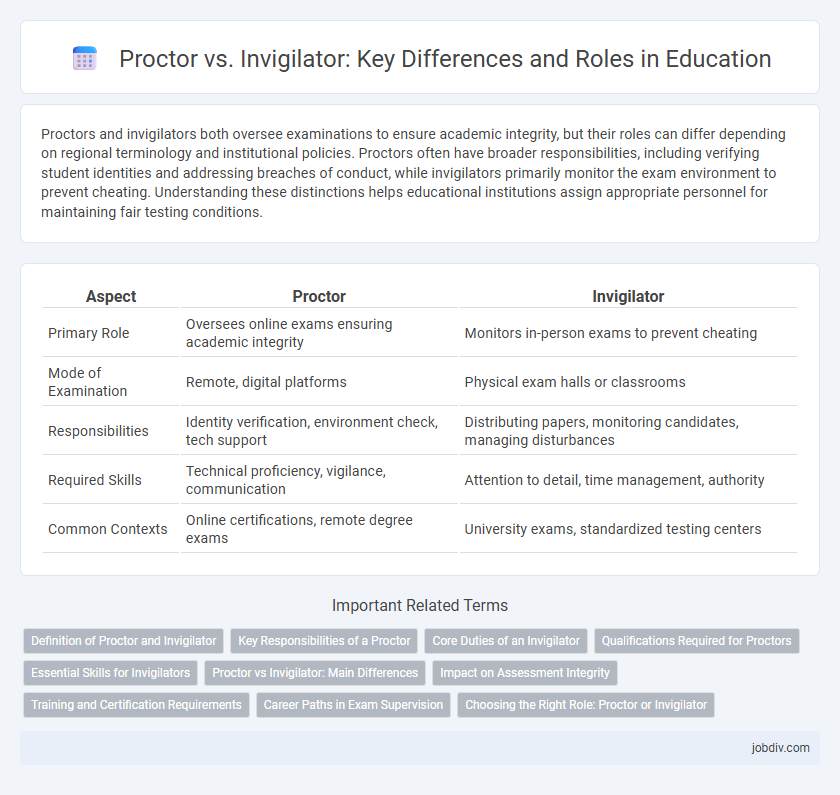Proctors and invigilators both oversee examinations to ensure academic integrity, but their roles can differ depending on regional terminology and institutional policies. Proctors often have broader responsibilities, including verifying student identities and addressing breaches of conduct, while invigilators primarily monitor the exam environment to prevent cheating. Understanding these distinctions helps educational institutions assign appropriate personnel for maintaining fair testing conditions.
Table of Comparison
| Aspect | Proctor | Invigilator |
|---|---|---|
| Primary Role | Oversees online exams ensuring academic integrity | Monitors in-person exams to prevent cheating |
| Mode of Examination | Remote, digital platforms | Physical exam halls or classrooms |
| Responsibilities | Identity verification, environment check, tech support | Distributing papers, monitoring candidates, managing disturbances |
| Required Skills | Technical proficiency, vigilance, communication | Attention to detail, time management, authority |
| Common Contexts | Online certifications, remote degree exams | University exams, standardized testing centers |
Definition of Proctor and Invigilator
A proctor is an individual responsible for supervising students during online or in-person exams to ensure academic integrity and adherence to examination rules. An invigilator performs a similar role, primarily in physical examination settings, overseeing the conduct of students and preventing cheating. Both roles are essential in maintaining fair assessment environments but may differ based on regional terminology and examination formats.
Key Responsibilities of a Proctor
A proctor primarily ensures exam integrity by monitoring students to prevent cheating and unauthorized materials during assessments. They verify candidate identities, enforce exam rules, and provide necessary instructions to maintain a standardized testing environment. Unlike invigilators, proctors often handle administrative tasks such as reporting irregularities and coordinating with exam authorities.
Core Duties of an Invigilator
An invigilator's core duties include monitoring examinations to ensure academic integrity, verifying candidate identities, and distributing exam materials securely. They enforce examination regulations by preventing cheating, addressing irregularities, and assisting candidates with procedural queries. Maintaining a calm environment and promptly reporting any misconduct are essential responsibilities to uphold fair testing conditions.
Qualifications Required for Proctors
Proctors typically require a background in education or training in exam administration to ensure compliance with testing protocols. Many institutions prefer candidates with experience in supervising standardized tests or certification exams. Certification in ethical testing practices and familiarity with security measures also enhance a proctor's qualifications.
Essential Skills for Invigilators
Essential skills for invigilators include strong attention to detail, the ability to manage time effectively, and excellent communication skills to enforce exam protocols clearly and calmly. Proficiency in observing student behavior to detect potential academic dishonesty and maintaining a quiet, controlled environment is crucial. Familiarity with exam regulations and emergency procedures ensures smooth administration and fairness in the assessment process.
Proctor vs Invigilator: Main Differences
Proctors primarily oversee online examinations, ensuring test-takers adhere to exam rules via digital monitoring tools, while invigilators supervise in-person exams, maintaining exam integrity physically within the testing environment. Proctors often use webcam and screen-sharing technologies to detect irregularities, whereas invigilators manage seating arrangements and supervise room conduct. The key difference lies in the mode of exam supervision: proctors focus on virtual settings, and invigilators focus on traditional, face-to-face examination settings.
Impact on Assessment Integrity
Proctors and invigilators both play critical roles in maintaining assessment integrity by preventing cheating and ensuring exam protocol adherence. Proctors often provide direct supervision and manage testing environments, while invigilators may also handle administrative duties such as verifying candidate identities and distributing materials. Their combined supervision helps uphold fair testing conditions, safeguarding the credibility and validity of educational assessments.
Training and Certification Requirements
Proctors in education typically require formal training and certification to ensure adherence to standardized testing procedures and academic integrity. Invigilators often receive institution-specific training tailored to the exam environment but may not need formal certification. Both roles prioritize understanding exam rules, monitoring techniques, and incident reporting to maintain a secure and fair testing atmosphere.
Career Paths in Exam Supervision
Proctors typically oversee online exams, ensuring digital integrity through software monitoring, while invigilators manage in-person assessments, maintaining exam protocols and student conduct. Career paths for proctors often involve roles in educational technology companies or remote testing centers, emphasizing tech proficiency and cybersecurity awareness. Invigilators commonly advance within academic institutions or standardized testing organizations, focusing on direct student interaction and examination logistics.
Choosing the Right Role: Proctor or Invigilator
Choosing the right role between a proctor and an invigilator depends on the education system and examination setting, where proctors typically oversee online or remote exams while invigilators manage in-person examinations. Proctors are responsible for monitoring test-takers through digital platforms using webcam and screen-sharing technology, ensuring academic integrity in virtual environments. In contrast, invigilators maintain exam security and procedural compliance in physical test centers, supervising candidates directly and handling logistical tasks like distributing papers and verifying identities.
Proctor vs Invigilator Infographic

 jobdiv.com
jobdiv.com